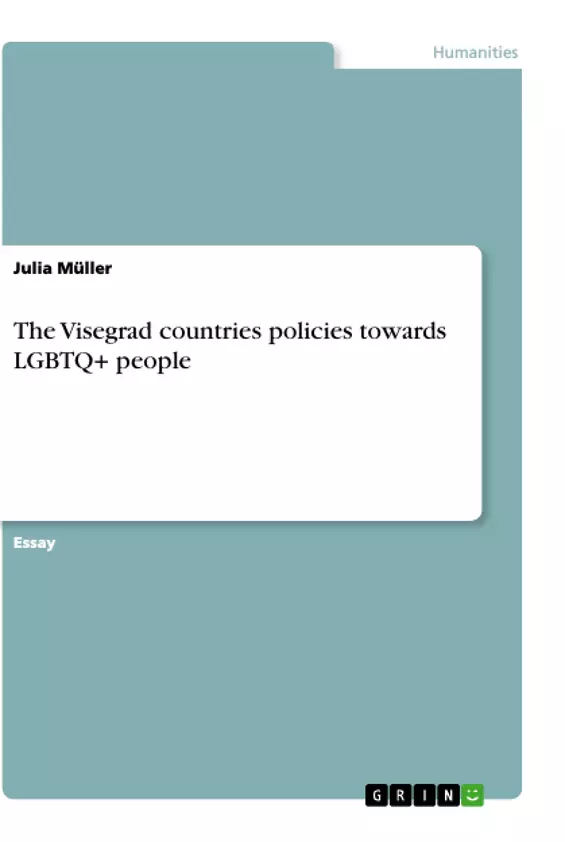This essay examines the Visegrad countries policies towards LGBTQ+ people. The Visegrad countries are Poland, Hungary, Czech Republic and Slovakia, together they found the Visegrad group alliance (V4) in 1991. Those eastern and central European countries joined their forces in order to push forward their aspirations for an EU accession. The collaboration turned out to be successful as all four Visegrad group countries joined the European Union, however only Slovakia joined the eurozone.
In general, the countries realized that a cooperation is useful to represent their common interests because they are connected by “their traditional, historically shaped system of mutual contacts, cultural and spiritual heritage and common roots of religious traditions”. The Visegrad group is referred to as "two plus two” due to their different approaches towards the European Union and its integration policies. Whereas, Slovakia and the Czech Republic are commonly Europe-friendly, Hungary and Poland tend to be more sceptic when it comes to vertical integration.
Inhaltsverzeichnis (Table of Contents)
- Introduction
- Definition of LGBTQ+
- The Visegrad countries policies towards LGBTQ
- Poland
- Hungary
- Czech Republic
- Slovakia
- Conclusion
Zielsetzung und Themenschwerpunkte (Objectives and Key Themes)
This essay investigates the policies of the Visegrad countries towards LGBTQ+ people, focusing on their legal status, social climate, and the influence of political and religious forces on these issues. It examines the specific situations in Poland, Hungary, Czech Republic, and Slovakia, highlighting the variations in approaches and policies within the Visegrad group.
- The Visegrad Group's history and cooperation
- The legal and social status of LGBTQ+ people in the Visegrad countries
- The influence of political parties, particularly conservative ones, on LGBTQ+ rights
- The role of the Catholic Church in shaping policies and attitudes towards LGBTQ+ people
- The international response to the situation of LGBTQ+ people in the Visegrad countries, particularly the role of the European Union.
Zusammenfassung der Kapitel (Chapter Summaries)
- Introduction: This chapter provides background information on the Visegrad Group, its history, and its significance in the context of EU integration. It also discusses the different approaches of the member states towards EU policies and the concept of "two plus two" within the group.
- Definition of LGBTQ+: This chapter explores the meaning and usage of the acronym LGBTQ+ and its relevance in understanding the diversity and experiences of the LGBTQ+ community. It also examines the idea of the "LGBTQ+ community" as a safe space for acceptance and understanding.
- The Visegrad Countries Policies towards LGBTQ: This section introduces the ILGA-Europe Rainbow Index as a tool for measuring the legal situation and social climate for LGBTQ+ people in Europe. It then provides a general overview of the LGBTQ+ situation in the Visegrad countries, highlighting differences in their legal frameworks and societal attitudes.
- Poland: This chapter focuses on the situation of LGBTQ+ people in Poland, analyzing the influence of the Catholic Church and the conservative PiS party on policies and social attitudes. It describes the "LGBTQ+ free zone" declaration and its impact on LGBTQ+ rights and safety. It also discusses the EU's response to these developments, including the withholding of funds.
- Hungary: This section explores the impact of Viktor Orbán's conservative policies on LGBTQ+ people in Hungary, particularly his changes to the Hungarian constitution and their implications for family law and LGBTQ+ rights.
Schlüsselwörter (Keywords)
The key concepts and themes explored in this essay include: LGBTQ+ rights, Visegrad Group, European Union, conservative politics, Catholic Church, social attitudes, discrimination, legal frameworks, "LGBTQ+ free zones", and political activism. It delves into the complexities of LGBTQ+ issues in a regional context, examining how political and social forces shape the lives and experiences of LGBTQ+ individuals in the Visegrad countries.
Frequently Asked Questions
Which countries belong to the Visegrad Group (V4)?
The Visegrad Group consists of Poland, Hungary, the Czech Republic, and Slovakia, formed in 1991 to facilitate European integration.
What is the legal status of LGBTQ+ people in Poland?
Poland's LGBTQ+ community faces challenges due to a lack of legal recognition for same-sex unions and the emergence of "LGBT-free zones," which have drawn criticism from the European Union.
How has Hungary's constitution affected LGBTQ+ rights?
Under Viktor Orbán, Hungary has implemented constitutional changes that define marriage strictly as between a man and a woman and limit LGBTQ+ rights in family law.
What is the "two plus two" concept within the Visegrad Group?
It refers to the split in political attitudes: the Czech Republic and Slovakia are generally more pro-European, while Poland and Hungary tend to be more skeptical of EU vertical integration.
Which Visegrad country is the only one in the eurozone?
Slovakia is the only member of the Visegrad Group that has adopted the euro as its official currency.
- Quote paper
- Julia Müller (Author), 2021, The Visegrad countries policies towards LGBTQ+ people, Munich, GRIN Verlag, https://www.grin.com/document/1214644



